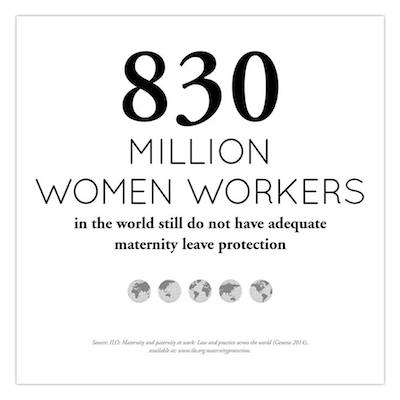French luxury conglomerate Kering Group is furthering its advocacy for women’s rights with the introduction of a parental leave policy for all employees globally.
The length of maternity leave, and whether the period away from work is paid, fully or at a lower salary, has become a passionate issue for many women and their partners. With no true workplace standard and a lack of government mandates in many countries, companies with policies that support employees’ desires to have children will be better received than those who do not implement leave programs.
"It's extremely important to show employee's that you support families, which will increase the value in their work-life balance," said Dalia Strum, professor at The Fashion Institute for Technology, New York. "They want to feel that they're living to work, not working to live. This will create stronger desire to invest in the time and energy that they spend at work along with the productivity during work hours.
"The Kering Group & its maisons’ policy will definitely increase in employee retention," she said. "When employees feel they are valued and the company cares about them, they are generally happy to be at work and feel like they're providing value towards a company who cares."
Kering Group, which owns Saint Laurent Paris, Gucci and Bottega Veneta, among other maisons, was reached for comment.
Family first
Leading up to its announcement of the updated parental leave policy, Kering shared three figures from the International Labour Organization.
The first alerts consumers to the fact that 830 million women workers do not have adequate maternity leave protection. The second states that in 93 countries maternity leave is still either entirely unpaid, paid at less than two-thirds of previous earnings or fewer than 14 weeks are paid.
Kering also noted that there are no accepted standards of international legislative guidelines regarding paternity leave.
Beginning Jan. 1, 2017, Kering’s new parental leave policy will go into effect. Employees of Kering’s corporate offices as well as those working for brands within its stable for more than a year will be eligible for parental leave.
Kering employs more than 38,500 employees in about 60 countries. Given its global reach, it is likely that many of its employees’ home countries do not offer such programs for those beginning or growing their families.

Maternity leave figure shared by Kering Group
Under the policy, Kering employees will be entitled to 14 weeks of full pay for maternity and adoption leave or five days of full pay for paternity and partner leave. In countries with favorable parental leave benefits, the local legislation will be applied in place of Kering’s employee policy.
With its new policy soon to go into effect it is Kering’s aim to foster a better work-life balance for its employees by taking an important step forward in the benefits it offers. The policy also works to promote gender equality, regardless of an employee’s personal circumstances.
“Since our employees are at the core of our business and out inspiration, I am proud to launch a policy that represents a major step forward for parenthood in many parts of the world,” said François-Henri Pinault, chairman and CEO of Kering, in a statement.
“This initiative, which is particularly close to my heart, reflects our enduring commitment to promoting equality between men and women throughout their careers, whatever their personal circumstances,” he said.
Kering manager and human resources teams will assist in implementing the new policy by providing employees with support before and after leave is taken. Doing so further bolsters a good management-worker relationship that ensures employees return to the best possible conditions and benefit from career progression over the long term.
“This ambitious policy will enable employees of the group and its companies in almost 60 countries to benefit from a standard framework that promotes a healthy work-life balance,” said Beatrice Lazat, senior vice president of human resources at Kering, in a statement.
“By guaranteeing the same minimum benefits to everyone, we are developing a more sustainable and harmonious working environment and contributing to a shared corporate culture within the group, which is a source of pride and well-being,” she said.
Living work culture
Oftentimes, a brand's image emerges through an organic, reciprocal process with consumers. Now that consumers have a louder voice than ever before, brands can take into consideration consumer suggestions that can be worked into their employee culture.
As a brand delineates core ideas, it is then up to the employees to spread the message. Brands must then recognize that corporate culture has to be arranged in such a way that employees can "live" the brand values each and every day, says Boston Consulting Group.
Building off of this, employees make the best brand ambassadors and gatekeepers. Employees both get the word out about a brand and can ensure that the brand's decisions are culturally sound (see story).
Work-life balance is an important factor for employee retention and advocacy.
Strategic sustainability in terms of employee quality of life can also be part of a brand’s DNA, as it is with apparel label Brunello Cucinelli.
Citing his education earned from the cafes of Italy, rather than traditional schooling during The New York Times International Luxury Conference April 5, Mr. Cucinelli shared that the objective for his company is human dignity.
Mr. Cucinelli considers himself a custodian and established an authentic workplace culture that promotes humankind with little harm, further fostering human dignity.
To achieve this feat for its 1,500-strong employees, the workday has a hard daily end time of 5:30 p.m., because he fears disrupting quality of life, resulting in a 1.1 percent absentee rate, much lower than the average (see story).
"It seems as though we are trending in this direction of valued maternity leave," Ms. Strum said.
"Parents are able to take the time they need to recoup from such an important life change, bond with their newborn and feel confident to return to their jobs when they have started to adjust," she said. "It's easier to provide stronger maternity and paternity opportunities, and in turn, retain their relevant expertise and skillset."
{"ct":"XZ7ftTt+XagMJ\/059\/UruJ7OCaYsQ14UgIJL74oS7MnZK93ftKYXI7OYmBtbKxhcZpeRGiYLHXFSrRTn0SeXopcM2XjM65WS3N2vcp9FP84bKanEPXfhPAQsmwHw3SVMrhcTqSkBxuCnBpMSgIuBIsxst978sKUC41A8AB0f5UdWQQPApydBsZRJkM6HV\/YfQSJhrAuDpGNnnpq5bD5gPOIVqn3Yr\/g221HhfSW9oErUa6Z53nf+YpgDmZPpUxc8M\/6Kjr4iysc9swHm2vFIvEEUXm5MLKw7YBe5IkoZCvU4AtCqB1OSp8sEeFF3f6OWBww00GP3iSQDP4qFaEey9a71wLKAHS7CduyjL4qToDYRXG3fJGcYomKT+cGt+pBLsAvfplvO2jyUh1Nv3sKpTaAaWpg2iGWKcHjG0NWWw8RJqfpY935fWVyUqewR5JRbgv6VztpxZVID3S20NjtnpB4BTWJs9ft05YmpRgz0ROoR4+LH9ZXm8vF3y9T8h\/tJ\/PEZzzc3NQ\/R+dWSkO3gfb3VzTUFz+ZCbqaP5b67rsRvGVoTHwIXR6p08haqJkrsEd6HXA+x+8Qf05CtbR2wvWgITtmcLBSXhz8CXvPvWWeQlcIZ02tvZCU0HECUmfu2G9+d8Hwjh06+5t2fYJkwVnGaYrICxdWb0C84lBjQOlTPQ0SOl4QaICDzPBEb5lD+JDPvL+eRE93PLVb2Y58J8lEsBxVYj+hovsMc48eRh03Ejmt1lKe90Pf2Rs4ZcnxwsFnEtZUaSORTqFIF0wxX+vyjugQM8zUNajAHGgSdSiVVCe2WgY2SfqquCc3sqI9sYvw487iG2zevAyQRjqH8FsWiOuXuumz6g5f9ZzZ9WmlQPP9JuU9Cqi2m+soIP8ptF05ZKTVDjRSLIF6HBrQMFENS2pjhJ8cdpI4EXT6MdrSWxGBqNFB3AZJiyQnJV8V5HbAsMy3nttg6Ci2Qz65ojjI6EaPVAvKM9lJDkRfMAG9C849JBpsPh6sEBhiwf8oxp1IhEBTUHGcNb84Wph5yKqDb1C5ieVvx0xG6ec73IU5OMcvzLlSg3TfDc7mCQcHoX9cj4K4mboAhjhNBu82j7os8OM+ABu7VmG\/S71ueBBHk\/48dCI\/XiuSfcCoo535E7yAbs9QcOx1FeI6K9BfPUcUKltPYp3+wVa5j9nZEOSBT79UvD9\/IsRnFfyBlDFpe3Ol+mYRzc+C8h9ZLndEF33EeWlSpXEpxCYFwsvpK0QPUtQg+mHYDYzlIG4heckUnUs4xbQSbtWPG0U\/xkan0KQ42N0kl6+1E3GlHaJF0iviTP2N3LWKMvz\/q1VYvbabNNxK29vRHOHg5fSwoIWfGb0aFFaRc90hIIQMRFMNnx\/gaYHM\/eMD\/o9mDEEGwRG5fTB1K3ijE+maysLJTv6XLCBkhdj3HaZ5cI4OiN9UKRGukzq1JYiO\/BqJ9m7CvqJ4FP9NmaN7S7LZgKL7vHr8ydxe9ze4xcv53jKXVZQK0xscTAFnqNtOXv\/3yLydiKgTpX+0opKtj3efQIacwN0X7BIiu1YcgjaVT\/jRpURV0NST+tiGAqr1TQlmW8KOo98lhQBhubUGGEtMCbXD1X+e52eIHET3alq5EbiPSYZ0v7c154fwLFNkQ2jz0a4KuE0MMudkRbZMijHwMFd2kOlsC2i3G9ZRryOvjjjip5DSIiqhy6\/kH3gzz9P31zG7s45be\/2M2KJulAuLgZmz5RAxW0vy31wZ+IkaTyWBXer92Qz3PYEx5HmQGr5cWgctVa0qLcpkjzAqNiorK1M0XIoHLSc0Tpho7kBB122TPc9ocKVBkr7eoxPW0olRASoobV2WOjdaEZygPsxbho+VOu\/M3w43ePm9TOFOqQkv76xJcYdiELBkUqjEQtwzzQWcQ\/Xu9DpD2i7D\/jywKTvoVSovzzatq0Z8RAUHutd4bLgV5uKZUsW44VNeIGDVoxo+CMXZNHDh4\/5EsXI+m5asC9\/yGUiLet20\/U0+a210k3MpNppPlGsNlRchSvI5eLjBAOYIuPvuh8NeRJZkcrJSMAIL9m1u5KG2s5semjxknOTZ1VJyQ4ai+3nChlmNWlTaZeoybShjOtZEhzCpnLbHOK\/I4A6We2XxRiMgq+Mfi\/Xxb6OlOvElIjIvRXy7Jm3J9gfrSMzajjaP+RDVeJUbmCzgTqw5aMwfW4F94pE00RtMtnL+eChhGl+yj0aQn21UlaSV0ymYMEQEVDGymYjl7SuqzQGIftzJ5EEvRDBHPShNIe+jG0NOOhO80lnp7OU\/nKrssPra9luiOZzBkapFuaEuKRSR0\/YxusGcGKsVUFw2X7wND9U7NOJVG4vMxhc0kQ867UJx4KHbkh+rkwGUsq4RMTJA4JPZNRScsNoxTubduP8g02IH7gHYv\/FvT9nbiN5ThbmIgoObo4mcO2dNLoV6Tvzb31xBdtVDktig1bWH3nuTP\/y1aitLn7QnWr18NP\/0hlUSj42SfQtIhWoYau\/rTVgUM+9yl\/XEdR31xDYfb5TJvyERFmeX3ePvTBl0gzOF16x44sahoreI0CjY+mB\/hoZVVuylUvST0L38UCDs109ocAPguzHg9E1bS01PvdczPq3ljl5N7j8NdsiV\/m4SIR8aDXVk0RZwUuq6SW\/EMTVJTG5XZikq3VSPatPiJ3emnuHBFWkq1f4mXp\/i2FCg1+Rohg52go\/qeUeATGkOGOhi93fZM0cG69xBBQjRGkG+NuxohBlua\/t5wx22EC94+SP3WFbNA1e+bnHoK0pAckm3t9Qnj80P903gVYD7tLawd7MqV7iTSwfGvs4aMWZ6IAKpBv6ZhKU2LQ652HoSnmXwM6P1X+i5J0Ss9dWvYspNoBLx7gEpmqSB5NSpwuiPHwH3u52upstkBs28l1WNNp2xC\/oMX1vtNc3cQ6qeG+BbkPzmxV5wNAbcjpQ6bQq+UgHODJ4omWsKg31\/TzWzRKsvCa6hwx\/1ohsWwov5DEe5OqQBp40ofXilfedpH77eedQAJtrAxIptf0JYpb9tq68bE6y5wN4ufewyC6XB1+uGls1ZYOqV5+LVx1jgdcc7msowmutWAJb8KEyR47gOdqVVgxG\/CTw2q4iwutEWc8\/H\/SJWuH1tpHeFRVIw0bmUMAgYLBA+BJfd3qpcAABoI7aOd3jFf\/OeGED0qUUigPiQ2rGncQMXvquORtVjJn67fykLxOtZirpA7c399FzBgyV+kKcocEnIz9qj3m2afVcutd0iaH4xh1I78rN\/25v3jeEdKM\/LNHFs3YFkScTyvxHJwpgl8AQ2wwWKfKwYt6WPfTByk8\/05e0EH5ZMoO6Qnn\/FjELQ0k+ioCrti7O7g9bRuKtWkyFCpV0Zy9If0uB\/mdXeR10BnxzJACSvwRJfIOZpBrHe1lJClGwPNEsrwcBC\/3ED\/57jo3yEDUBgbbsliHKKHN6xcNAfLInLlCn4++5SGYka1LiL0KAeoeuheOlg3yQk0tdCOOvtm39Rw5VZXNOtJnuD7bxcXA1qfuKb4qSKXIo0MmW\/eOzAoz0i8SweLvhMTXYucNCIMvAxX20k7PmjxbcDqYgd\/JOLj2oQYuNnXrW9suBSl1qa2vXl62D7zX6PZwQTNd\/6+6Mcmad7SDaOeKO4LNzDwhgWmSDbCTVvSOM75v3Q5NTkq2Oj7MO4rFrBatA76wfs+U3ZrRpiXy1+epz0B+6A3y4WENhxUNlGTFvlzf1DhnBsb6S0fgNmY0adWEBMpaXke6Squigv\/gOTSUlGEP000MrV+a6W003cwos5lUJ1CfqizcvWrxHjgPOOAStOkC5f1ODF1o9arV+mqu+ihJhiAQNQacDoqcEHUpxqasV\/kW6G\/aO9b88F+9LSYeSlxPaiM+Q6AxEUOrkLIW38VSX\/nfQ1sxUmhzCcmBHhRrFpmKJaRalwqTnZoAzNowgKymeyNUe5i959hO3GMDEdBJlUmIH8xAjfaw6dMa\/YSD4Z+yvfnehSPf3fbpqxq4JYLHzGMbr2arK8ZELUO6R8T75c5hHv+3TcqTzhgQ9Ttnfxz73siwh5bh\/XLTVAoVUzihYhheV7hKvao1wOn4KnjNJDfuBN\/MJYYQy1+r0v1lOm42oJZqJRS8P0003Ffh6RhQybmOKfztidY2AJMz\/VfjMASzXXBOU+VSM\/IQLDAwGcgUZd7+sQj570OyzIRjDibZTFrnKUDNonR2LtoiEZSw0ZUnfu\/Zsmk9C1a9BayGOI7toForE2pxUzRvxOFAUPlK6qDr0GsX+lPx6EtHfzOULsR+vTOjWoZm4kiCKErpV+r6hudPHmHdnVrrx80yCElhipHk\/ywzQFRLAycpgSoGIIcUeSVr1W+gVQ1uT\/6UEz1BXc03mVPa1RFk4stQ0CrWUKjFbv\/I9jpG\/GlOy5Nw5pGdy5pkPIl5y95YnMole9Hy18ACDEkKqzLs15WQ5o5ar9t1kq6\/lg43GX4V0KWbTgq9UOHuyk6QWW7+J\/jshs20GG1XTaFLbUmzub\/cB2P2zx2E6tuowpyRJiGHH\/VhH2WEIiRd5gAErGC2mTf4i8\/fNj4iyXHLiZviB7o5+\/H3O1I0euF9pgmtu3tUewfyiN0lH3oslmAb6Jk4mYvyH46Y74l462d5nx46rzpdL3a\/hPEnC+54Zh88UASt5EiFrxF983UnKZLOWgy\/HCfMFvuklAi6qP6JDn6O6qhb5wq5rzXemSY7WBMo1Gikr1ea2ZIB\/Only+8Xd77sLDmohtDL3y\/vX4oi+FOQMC3P1WfgzeNFNAlJ\/lEO7nuMrOboS\/VCP0lTnImtj6Q0QBVFzYm1c\/XgUaPrQINtoxiJYwnVRhXH05hoXVo8aJAcbXcrXO+4zn69\/30XQW6D+Ue+I38WBRqGeF9eE9zzYNEwz4ChmVquZuNnoESsUf3O4GN+VXGRzlybzHnQnAobS3xL+eweNkxdzbhEsLE+xNuYqbaMZKgBgPoqZ0gxO8bGPlG5\/7sPRf5Cpm2FYM+m7wCn9UkEywRxwqwpDlDKjU7WYfFINhPqCmIIvK+bf8yoxYs+YlS71AwQ6sY55EMHhVgK0j1kZPHCp6EsDlljqKVDYytaX4qjArxhW8oLDuh0IcQdgQaYv8l2N8lU5zQ+jbjUvfweleHM1i2CTwKDWZGGTOgLFYJxXHZc\/u0bp4iDOZOeMdmGbeziMUoUWkstcf1aA91Ja0LNxo0YjJDz9cdaPrDV0dWLP0kF2JFX00VNOjVLOxqF146VWd6GIisQfxN4BDC7FfEoZ3+j4374Sw\/7IW4lyUex0wr84A8r5o7Coq2G7PMn7cGNvPLqQBh\/3ZDqOFs4+w\/fhTAvUJ\/3eme8xaZ2tvtNwD26qds7jM7EWayn7+syDKNzHJJ923T5LnfXqchenAFUJLUFbARb5jBgahofvitCuZrg5Bmk8zbeqHB49O7XSK6mmfJOkJKFzwqhwvAhjnd4g3m663R7U5pUYOPqbjwZgeEq9TGA8PSk26R9GEzNXLps3gb0oKKXfjbq37NQFqMrcAPLNU710S835wHBi+AR5TrqhV4LMqGklZioE9QeqRiwBc9HTlsSi2AgQqLSTjTTvJn0aSCxrAsN4LKooPL4g3u3xy59pHulJW1UwojJFesHSeKlPSvuEw2or6XP0yl5g+kYPgMKfHaiAq6sL3vcrWE0MZZeHoeIqVVOtPqZEFqHtBBjJ56RMEOAFNv5po79fEyB8XhrXkdiRapepCs2d2xd2S2EsKxTRg11\/bJXkqEPIVeH38qGTiapECRBbdhW8o3oVO7bgFo8VrF6DPvVzTci9dHSdj0nL12RGym2XiRIKWl77Mr5DGUTOxOCC0JIipNPqs67BhTA+DBoLKEKwcFH8y5+leccWTeA5EWIT8qbydaurepzAmusC2LE0nCXHkXpu3DxEZjHLUFfxfhZ5T1f0Z\/1xiYASzi93jL\/SCYgRzECMYr1KJYI25dU0r+4ziZOMrq\/3yXd7k8wDiP6Hh3Ba1zxK9h03dA5swbZKlj9NBqltAQMbej02hEALum5WdDENduY5dKe\/lmQPD8nvfA8d0y3N8vLORX8Em1lwtUWsR2yO5n5mqAj4FFjZlIZVpXCNLJmYtc2aqxRQyrNrgXVqxNgIDRcFX3CNJja8bdY7UNbsIfqjHh+XB5sg2ZmepaMGJemyoNwdMqp+dpQHvDTz53NGKssBxVLceJfU4hWIKLCYclPi1uVvLYvz35qg0jOVqtg5wGYjumbwFS7duIhblzltngLBPbxIX0NXS\/E7nS7IINcwV+U9uGRtj9e04M7a7gd5ShlqN+VZqJcHh+CugzYEZhpqJFdXRwvMOJLra0d3tvRMIQBpOt\/oKrQIuJYiWgbWK3V\/mG8v3ljlIEeJf35MfcxwRaXi4WpR7BiCA4OGyzIgVSymmCxu3Zv2B9bVxdiVFMiMl4MAqmVsuiAZGWKLtnkRyF1XRwTj5b2bb1h98hiedcotD7A8IhUP8NtU5bVgP74G5j3rDwXm75815EzPq4klEalKhI0ptY2QFiAjNeu7zr2xiek51dQSFdEEXh732l9DbFFndHRF7e0y4mlp+aPtvEyY8P92eUsEgTz1KsqWV2LiC7dN5T+ym5\/Hx2EJTNMyXCZ\/zOTnR\/YGKYUcPCI5VXGd6YisdE62x909rpz1XxS\/ip9El5Qbfn4icK3PaWBpf705YjWSfv21cv92ruR+FYFk5lgH7Y6JJS\/ljRkTUSOV5C65vTZuh9+1ASIIfhZ4\/aguBFzK9dgHl4CnJ2kZxUO2xzsccNMhLSkPK7LCHk\/YisMAGGnSKjARIR3VolUd7vsoBzIfAOu12dwK+HO6mdIJdBLyiyrbXiIijwQMX1AO78jVbBKCV6H0MEsMRTjUseOUGr5Itj8KN8kZCVCqxDPwdTvPJp2sZJkmxXd8Fcu1ojw+3h\/7O8zgqgpnWEIX8r8mxxzNoPlJvmtlEZ744Ht5tOZzxmjQcW0nzwD4K10uXfgFLwqBrXNzC9p61ic9ubEX5dGnEz9p5NNOA\/AY8Kp6LgYi+OIeZcgdS3eg8VuFyonbXbe6RuDui6DlErmrWoNb8o6KZJ8dS4XhdH3mGLIcRhV4PkNUTdVocYemNO2YvYBileYaVSc2tt+EEqERGIMZFmlW8dGw5HYCjzTFyuVllUlchwuizY0047P4ijizsJ5To2m3CVppYMogqxY2B8\/tVFSgxO86FJQJYaplu7WymEJrpLWiyFneZ\/Mw3WCrtdeUSYhxtTWPdWRyK7DzepxenZJFIym+USPXMLeLOdPgk1j\/jXcDrt\/OBMJIoqtUo+G75dBX2JPO+h47j8zQoYitKMyqlHM1oAu6A1YdGPW1q6V8IY3OoXzIUbrp1AslncK6Ye\/COgZ6t8RT7DH3qYpWw5VdbbFMdDNEVNsSGT2oviGe4EmBGw\/uBgRj89D72Az9XlPRxCeM4xrI6kK2396kmP0DT6bAgeI69Lf\/\/bvKOZc0HJff6sgC8pXrXghE7rG\/OR+Y9sgOkdFiBEXh3QpsCrorHEUhrTiNzj4ryDiGRvwXwSqRw2gKEPuQ0be+aw\/lydhDCCeJlDmjhLaZMLQ\/\/Ul4i1JQzxK0hz6FNhbsWouD3CrpwY4XrOzxTPl8qLR\/fvGJT\/XY12N386JIvnITGfUGdioNgpo9dhwq8rFa8ZLwBnKZW14ep5iBXL0vn+5o8apdoObmKLmPDhTpR4aKxkSXs8Mq6\/Gptok4g17vruC0iT3NCTXk+l6DvHsMgfjqhxD6RmutETAUwdFjid31BPLnqeTq2X7+AlAH36ubjAKlQtgvtozt64jEtj9VGM5O9nx41UwUUqG9CjaIDfW9id6xkH8bVyq298yzo\/oGY5hs3PVXO21\/XxNX9f7vkQVFOcy6W8mSr+5B5mQUI1MvbMKYVu6JggdpJlcVNezVmcR3B+0X1CNJv05g\/GCFRSaTf7BNUnn9mc+ZkDQ9oobtlHFM3\/dFpEFazIt4t6UHFJxQP5Nk8V8WEwb97TUsd6OAegjPewMDsBx3Y0dU9UK2\/XjA5+\/8b\/zJaejx2+GYv+XawFeQGkjpD9xmbOlM+h5IRpE6CXNGpu3ABFIW1gxtOqt4OZL9HZVyFYowLueiYxwkphW7xFAYkiMFeazy6z\/xNooe5fYTKCzUAQP\/MyUaynag0pLHsgAYJW\/C5881dO7zokjCWTofuqBWXbIIH0IVtNPNyH+CX6P9YHndIqkKDtCFS3hgVkiEXP3ckUyzy6onYe+XTago+CNqSiduULsQygByHBU3+yoZLwoJClQKOEki+DPkK0ZEspoYpr66Mz1IXZX5z6vYLXZ4NBaawTzvzWUrlOd8pLcRFXFCKyebFLvcqVUDUhe0LT9wvApTrJ8F5xyPurM2ArSrMMAqd4VjB5uj0X1NplfVPYsNLU0tMT+DkPRwCS7YH3gZ3rukx5C3gSaa2K8iY1tqv79YWXmny6ySHGoxxhtqjwndrPCOR8ZCToaV\/WzbVRBtaUrRzHlyz1FylbLZwep4++YSZ1FRQ3ztFqgA6OVMHaZfw1qAg\/wxBiR66y1HHYb50Afag9TXr6zraahx1afKwDmtzp1Cthwj9bIqAF5AqZyGQZdazoNwK\/5jJm1NRGLAK3xxgI955ypAwWT+yA4g1DPo1pLnuNjJ3icjFzAFBE8Kne5dDirAsTDNXetwAB1EIfIHmhRO6prKhIao+lsG8mp0RtCJCSenxzfz\/gAhcHGYlEpOAivCzqdpZXWpvGjrbaTSmxpW94UPfCYxxyANnXzolCQ9UUUvo5l9bqHoAxqVQgzOK2khJokWNy2cr2uuMPu8MpxV6tYhBzchVGl7GKlgT5e\/hlSkethiBMUlcNfWfFWbCpQJ0gomZxk8VMBA5KulInDrFp2PirnbXhDC8\/b6NTgzp3TwB8pbRMKgxglLRlex1Rse8w\/+FeEAt\/zh7W6sWsS\/oBJxxI62ozsnliKi5EQ9zppeZBerltA6LaNbitw1sUza3jUuSrP9EF9hAW2IbY0\/R8p06NgR6vPwUM\/vKRnDs9fAcUvYxJhbRqsblxDeg8Sh5XqvvOkzn5XYq9fCDydPn+U++cgQPERmMbU8yEyaXOLdzwXM6WaLbsvs\/UXOUjh6bJoIVm9PBPJsOc5lGHWR6orCkMbF+yp6c6dD3u0gLzxMdMbgNmbQmxob+ugQmAr9YrUD5IRbamINcwtkPh9svMTQGsYnlYfsTJC+Wj74BG4YR5XVJU6k\/kNEbtWmAy+p15HD+HnXcrnKMfB7rP\/TDJCbkhIwfqoC5AsXiY58NQLH2Yc0J8OUa2fbDUnJDU+rKNHrhaNxszgqPE\/3TtiP8pr35O6BL8QVw4dliGMY49TdsuDWQz\/S5drK9FVNRkDdpuuFLCsCGXURTS6Jne\/hTpumpYfzhnFcugJ6sOxSizco4x4k7ZohIwtoNnOZMuw6wPgHtr2DtJ1GbM8u\/M2tV\/s5fRd7Bgn+5fjd40nrlIXCHvAkgLzu2MRX4D4xpLz+nlnmdvOdfnuWOc1CwDEIkVG1PYzm7uv5DGYpHsuB7iLMBjaS7Y8ZIFE3Obe3rrhitnfU47cm+Q6bHO2TyNLMJg4hnLmVCJbTFpK62yA\/p8vaYgvezCp2Ydskup8rvuTTCNfJZ6l7Pc7tLreccmESc22sFkmH5KAmUDZCs2PE62OvQCdp\/X0diqh5zL7ONN2tK+C84qzxPcrtZRfKGisW+PZFJZoIMk9BKD3OBtLKSO\/XTj7\/V\/jk8GR6V1AzstalbcxDesr0tOXWjAfGXgN5mpmmI451+\/8P7BaUbxyMxDNDMS0\/3gTwqW6iiaDSlPKFRwrNoOTzX4CkQqkY4\/taLkzbTS\/SgSpC9rQSSCCfYPpu0lMqi3V0Vn\/FBVVvzNxY9W5NcZcKu0zhRGdgfPDbX+I1YsXkktBQ2qAkUPOo1u2q+KYJlFPNH1iPG4sS6f57k4SnNBk0DCORtxu8GsSz5KypvpKnSfEaKCaUPgmGHR1kDzunH2Uo5LKx7TgiS3rpukCUhs5XGlOb+rwzhhiwEiIUcp4h83J7b38TBQWREazukbFqyOr1A9dpUcupjA6iekQR5e6Qwf28e6+DN98grRi1n\/hWxYcBOi0xKN9N+R6a52xaqTQFBko8jALD03We2tLPWQqFASLEJKJNLfqKjbBNTYHrm1AtbxrerKDDh59vvHzX8=","iv":"0b5a73ad9603e7c02dc3fd4add9fd711","s":"53cbdd9534f2490b"}

 Image courtesy of Kering Group
Image courtesy of Kering Group